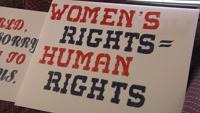MILTON, Del.- The Town of Milton has settled an ACLU of Delaware lawsuit brought on behalf of a homeowner who had been prevented from placing political signs in her yard.
Both the town and the ACLU announced the settlement on Thursday.
In February, a town code enforcement officer told Penny Nickerson, a retired schoolteacher who lives on Union Street in Milton, that she had to take down several political signs in her front yard, which contained phrases such as, "Love Trumps Hate" and "Women's Rights = Human Rights."
But Milton's town code at the time stipulated political signs "may be erected no sooner than 90 days prior to any contested election or referendum and shall be removed within 14 days following the election or referendum."
However, on May 15, the ACLU of Delaware filed a lawsuit against the town on Nickerson's behalf. The ACLU challenged the town’s sign ordinance as it relates to residential lots and claimed it restricted Nickerson's right to free speech.
The town maintained that its laws were compliant with both the spirit and language of a US Supreme Court ruling which governed sign code language and so it defended against Nickerson's claims.
Ultimately, the parties discussed and came to agreement on changes in the language of the sign ordinance for signs on residential lots. On Sept. 11, following receipt of advisory reports from the Milton Planning and Zoning Commission and a public hearing, the Milton mayor and council unanimously passed ordinances that revised the town code.
In general, the revisions eased the administration and promoted the residents’ and property owners’ ability to express their views through signs, while still
serving the ordinances’ purposes such as avoiding obstructed views, distracted motorists, and tripping hazards.
Specifically, the ordinances eliminated categories of signs, including real estate signs, contractor signs, and announcement signs. Instead, a lot may display four temporary signs at any given time without regard to content, as long as the signs adhere to size and location restrictions.
Additionally, the restriction on signs judged offensive by the Planning and Zoning Commission was revised to reflect the definition of obscenity from the Delaware Code. Finally, the changes allow a sign owner to substitute a noncommercial message for any other non-commercial or commercial
message.
"Since the passage of the town ordinances addressed all issues raised by Nickerson with the sign ordinance, and based upon the advice of counsel, the town has agreed to settle with her," said Milton Town Manager Kristy Rogers in a press release.
Rogers added that the settlement was entered into to prevent additional time and legal costs and "should not be construed as an admission of liability of the part of the town."
The ACLU also issued a statement about the settlement.
“We are happy the town has revised its unconstitutional sign code,” said Richard Morse, ACLU of Delaware legal director. “Every town should be on notice that sign laws that restrict signs based on the content of the signs are suspect. With few exceptions, they are unconstitutional.”
In a statement released in conjunction with the ACLU's, Nickerson said, "“I am delighted. I wish the town had just listened to me back in February, but I’m grateful that the ACLU was there to protect our free speech rights and make the town follow the Constitution.”








